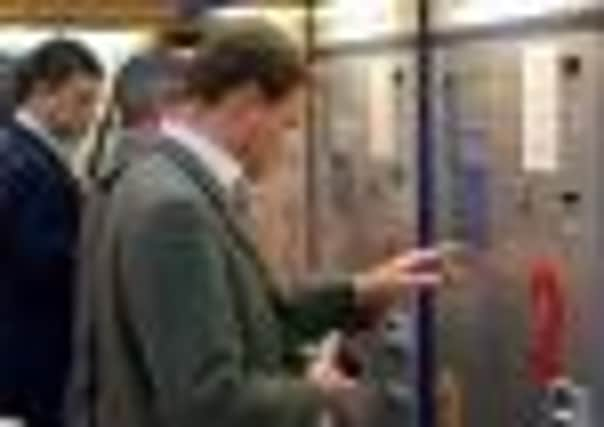Rail fares to be ‘rebalanced- but not increased’: Whitehall review


Rail fares were “already too high”, said former Civil Aviation Authority chairman Sir Roy McNulty, who led the review.
His team said the Government should undertake a full review of fares policy and structures, “aiming to move towards a system that is seen to be less complex and more equitable”.
Advertisement
Hide AdAdvertisement
Hide AdThis should “aid the management of peak demand and the more efficient matching of demand with capacity”.
The report added: “The study’s recommendations envisage some rebalancing of fares but no increase overall.”
Implementing all the McNulty recommendations could deliver savings of between £700 million and £1 billion annually by 2019.
UK rail fares are already the highest in Europe, with season ticket holders having to fork out for an average rise of the RPI rate of inflation plus 3% in January 2012.
Advertisement
Hide AdAdvertisement
Hide AdToday’s review said rail costs should be 20%-30% lower than they were in 2008/09 and that passengers and taxpayers “are paying more than their counterparts” in other European countries.
Launching the review in London today, Sir Roy said: “Achieving a 30% efficiency improvement by 2019 should be the target for the GB rail industry given the study’s findings on the industry’s costs compared to European railways and other industries.
“A reduction of this magnitude is achievable, and is essential if passengers and taxpayers are to get the fair deal they deserve from the rail industry.”
He went on: “The rail industry has the opportunity for substantial further growth, building on the successes of the past 15 years, but the licence to grow has to be earned by greater efficiency.
Advertisement
Hide AdAdvertisement
Hide Ad“Out study has identified the barriers and what needs to be done to overcome them. It is now for the industry, working with Government and the Office of Rail Regulation (ORR), to rise to the challenge.”
The review found 10 main barriers to efficiency. These included the role of the Government in the railways, the franchise system, the fare structure and the way in which “major players in the industry have operated”.
There had been “excessive wage drift and inefficient working practices” in the industry, the review said.
In a move likely to infuriate transport unions, Sir Roy’s team called for a review of many aspects of staffing and working practices and spoke of the need for pay restraint “in relation to both staff and senior management”.
The review also said:
• There should be no line closures;
• Franchising should be reformed;
Advertisement
Hide AdAdvertisement
Hide Ad• There should be “devolution and decentralisation” within Network Rail (NR);
• A Rail Delivery Group should be set up to “lead a substantial programme of change”;
• The use of smartcards should be accelerated.
Sir Roy said: “I would like to emphasise my view that the long list of barriers we identified should not become the basis of a ‘blame game’.
“There is no simple solution - no ‘silver bullet’.”
Network Rail chief executive David Higgins said: “I have already moved this company into a programme of major change that will see decision-making pushed down to our frontline organisation, where it will be better able to respond to the needs of customers and passengers.
Advertisement
Hide AdAdvertisement
Hide Ad“We are well on our way to cutting the cost of running the rail network by over £5 billion in our current funding period (2009-14). We recognise there is more we can do to bring about fundamental change within our organisation to make it more efficient and customer focused, which will include a completely new kind of relationship with train operators and with suppliers.
“Sir Roy’s work gives the industry the direction it must take, a direction that has our full support. That will involve more change, but it is change for the better, change that will deliver an even better performing, sustainable railway for Britain.”
Bob Crow, general secretary of the Rail Maritime and Transport union, said: “The inefficiencies of the UK rail system are entirely bound up with the fragmentation and profiteering of privatisation. A graphic example is First Group bailing out of the Great Western franchise three years early, depriving the taxpayer of £826 million in premium payments while soaking up £140 million in government subsidy at the same time. Deal with that kind of scandal and the Government could claw back their £1 billion savings target at a stroke.
“Attacking staff, ticket offices and jacking up fares, while the train operators are handed gold-plated franchises, is just an escalation of all the worst practices of privatisation. Blaming loyal, hard-working rail staff for the gross inefficiencies of breaking up the industry for profit is of course an attack that the RMT will resist.”
Advertisement
Hide AdAdvertisement
Hide AdThe Transport Salaried Staffs Association warned that off-peak fares could jump by more than 30% over the next three years if the Government accepted the report.
General secretary Gerry Doherty said: “If inflation stays around 5%, passengers are already looking at huge increases of more than 20% over the next three years for all fares.
“Now McNulty wants some off-peak fares to go even higher than that to ease over crowding around the rush hours. We could easily be looking at a 30% jump in off-peak fares at a time when passengers are already paying the highest fares in Europe.
“This will particularly hit commuters into London the hardest, especially those who stagger their journeys to get cheaper fares. They are being squeezed until the pips squeak.
Advertisement
Hide AdAdvertisement
Hide Ad“Rail costs the taxpayers £5 billion a year and we now have 100 private companies living off that publicly funded bonanza.”
The review said: “The study does not recommend an increase in fares revenue overall, but instead envisages some fares increasing and others decreasing correspondingly, within the same revenue total.”
It added one area that could be considered was the possibility of reducing the coverage of off peak/saver fares regulation.